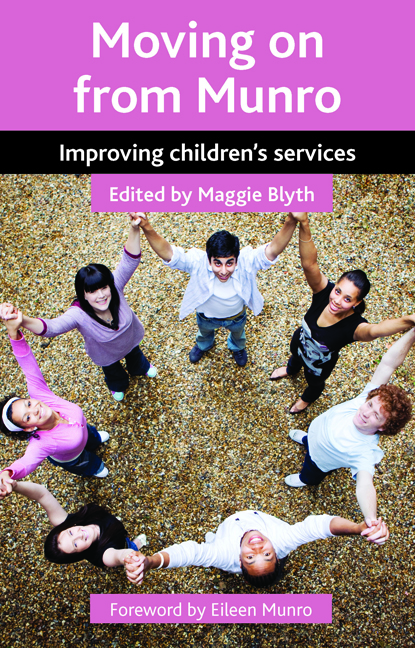Book contents
- Frontmatter
- Contents
- List of abbreviations
- Notes on contributors
- Acknowledgements
- Foreword
- Introduction
- 1 Getting the right things right
- 2 Child protection: 40 years of learning but where next?
- 3 Doing something different: reconfiguring front-line services: opening up the market
- 4 Re-imagining early help: looking forward, looking back
- 5 Children should be seen and heard: understanding the child’s experience
- 6 Responding to adolescent risk: continuing challenges
- 7 Moving on with Munro: child sexual exploitation within a child protection framework
- 8 Missing children post-Munro
- 9 Symbolic half-measures? On local safeguarding children boards, their contributions and challenges
- Conclusion
- Index
Foreword
Published online by Cambridge University Press: 03 February 2022
- Frontmatter
- Contents
- List of abbreviations
- Notes on contributors
- Acknowledgements
- Foreword
- Introduction
- 1 Getting the right things right
- 2 Child protection: 40 years of learning but where next?
- 3 Doing something different: reconfiguring front-line services: opening up the market
- 4 Re-imagining early help: looking forward, looking back
- 5 Children should be seen and heard: understanding the child’s experience
- 6 Responding to adolescent risk: continuing challenges
- 7 Moving on with Munro: child sexual exploitation within a child protection framework
- 8 Missing children post-Munro
- 9 Symbolic half-measures? On local safeguarding children boards, their contributions and challenges
- Conclusion
- Index
Summary
When I began to read this book, which reports on progress since my review of child protection, I felt some trepidation. This was not just the understandable anxiety about how good my analysis and recommendations are proving to be in practice, but also because of knowing how the austere economic environment is affecting both families and professionals, creating a harsh reality where children's needs are rising and funding is being cut. The authors here, however, paint a picture that includes reasons for optimism as well as pessimism. Working conditions are indeed hard but people with creativity and determination are making progress in improving the quality of help we provide to children, young people and their families.
The traction that my review has had is because, in the main, it gives public voice to the views held by most about the key ingredients for working well with children, young people and their families or carers. Central to these is the importance of developing respectful relationships with those receiving our services in order to maximise our ability to co-produce improvements in their lives. Previous reforms stifled the creativity and humanity needed by putting too much emphasis on improving practice through standardisation and prescription centrally of what to do. These restrictions have only recently been removed. The amount of central control has been radically reduced and altered in the latest version of Working together to safeguard children (HM Government, 2013) and the inspection process has also been revised to focus more on quality and the child's or young person's experience than on compliance with case processing. These changes create more scope for professionals to take charge of their work.
Another basic feature of the work that needs to be sensibly addressed is the unavoidable uncertainty that lies at the centre. As Gurrey and Brazil discuss in Chapter 1, ‘confident humility’ is the most constructive approach and the public need to learn how difficult it is to do the work well instead of baying for blood when a tragedy occurs.
The changes that can be attributed to my recommendations are, of course, only part of the developing scene in children's services.
- Type
- Chapter
- Information
- Moving on from MunroImproving Children's Services, pp. xiii - xivPublisher: Bristol University PressPrint publication year: 2014



